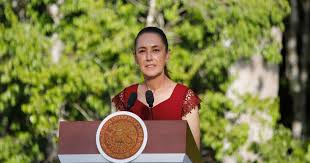
Mexico President Claudia Sheinbaum Denies Awareness of US Drug Initiative

 :
| Updated On: 20-Aug-2025 @ 12:22 pm
:
| Updated On: 20-Aug-2025 @ 12:22 pmSHARE
Mexican President Claudia Sheinbaum has firmly denied reports that her government has entered into a joint agreement with the United States to launch a new counter-narcotics operation, despite claims from the US Drug Enforcement Administration (DEA). The initiative, called “Project Portero”, was unveiled by the DEA only a day earlier and was promoted as a flagship program designed to strengthen cooperation between the two countries in combating powerful drug-trafficking cartels.
During her Tuesday morning press conference, Sheinbaum stressed that no such agreement exists, clarifying that neither her administration nor any of Mexico’s security institutions has signed onto the DEA initiative. She stated that only the federal government itself, not individual agencies, has the authority to approve and announce bilateral operations of such magnitude. She also noted that the DEA must follow proper diplomatic and institutional protocols when making joint announcements.
The DEA, however, had described Project Portero as a major enforcement effort. According to its statement, the operation was intended to close drug-smuggling corridors along the US-Mexico border and bring together Mexican investigators and US enforcement officials in a multi-week collaboration program at an intelligence site on the southwest border. DEA administrator Terrance Cole characterized the plan as a “bold first step in a new era of cross-border enforcement.”
Despite the strong language from Washington, Sheinbaum dismissed the DEA’s claims, suggesting that the US agency may have misinterpreted a minor training exercise. She explained that the only cooperation currently taking place was a small workshop in Texas attended by four officers from Mexico’s Secretariat of Citizen Security. She insisted this was not a coordinated binational operation and bore no resemblance to what the DEA had advertised.
While rejecting the Portero initiative, Sheinbaum acknowledged that her government has been actively cooperating with the Trump administration on broader border security arrangements, emphasizing respect for sovereignty and coordination between equals. Since beginning his second presidential term in January, US President Donald Trump has exerted heavy pressure on Mexico to curb immigration and drug trafficking, frequently tying the issue to the threat of punitive tariffs on Mexican imports.
In July, Trump announced a 90-day continuation of tariffs on Mexican products, holding them at their current rate rather than raising them to 30 percent, as he had previously threatened over the continued flow of fentanyl into the US. He labeled the measures a “fentanyl tariff.” In a letter to Sheinbaum, Trump accused Mexico of failing to stop the cartels from turning North America into a “narco-trafficking playground.” Even with the pause, Mexican goods not covered under the US-Mexico-Canada Agreement (USMCA) remain subject to a 25 percent tariff.
Despite these tensions, Sheinbaum has largely avoided open conflict with Trump. Instead, she has taken steps to demonstrate cooperation, including transferring 26 high-profile cartel suspects to the US for prosecution and earlier sending 29 cartel leaders in Mexico’s largest prisoner transfer in years. These moves came just before Trump threatened tariffs, signaling Mexico’s balancing act between resisting US overreach while accommodating demands.
At the same time, Sheinbaum faces scrutiny for her handling of Trump’s hardline foreign policy. The US State Department recently issued travel warnings for nearly all of Mexico’s states, citing “terrorist” activities, while Trump has designated several Latin American criminal groups as foreign terrorist organizations. Reports also suggest he signed an order authorizing military action against such groups.
Critics fear that such measures could pave the way for direct US military intervention in Mexico, but Sheinbaum has repeatedly assured that “there will be no invasion.” Nonetheless, she warned that any unilateral US action inside Mexican territory would be treated as a violation of national sovereignty.
In summary, the controversy over Project Portero highlights ongoing frictions between Mexico and the United States under Trump’s second administration. While Sheinbaum firmly denies DEA claims of a new joint operation, she continues to walk a careful line: rejecting unilateral moves that undermine sovereignty, yet cooperating on extraditions and border security to ease US pressure. The situation underscores both the persistent influence of Washington in Mexican domestic affairs and Sheinbaum’s attempt to assert Mexico’s independence in the face of escalating cross-border challenges.